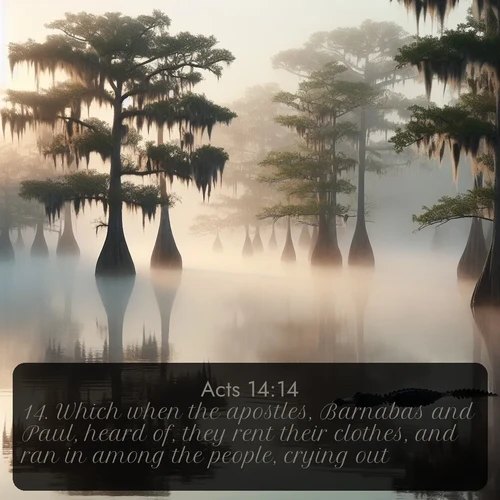Acts 14:14 plusieurs versions / traductions
English Bible Translations
14. Which when the apostles, Barnabas and Paul, heard of, they rent their clothes, and ran in among the people, crying out,
14. But when the apostles, Barnabas and Paul, heard of it, they rent their garments, and sprang forth among the multitude, crying out
14. But when this came to the ears of the Apostles, Paul and Barnabas, they went running out among the people, parting their clothing, and crying out,
14. But the apostles Barnabas and Paul, having heard [it], rent their garments, and rushed out to the crowd, crying
14. Which, when the apostles Barnabas and Paul heard of, they rent their clothes, and ran in among the people, crying out,
14. and having heard, the apostles Barnabas and Paul, having rent their garments, did spring into the multitude, crying
German Bible Translations
14. Da das die Apostel Barnabas und Paulus hörten, zerrissen sie ihre Kleider und sprangen unter das Volk, schrieen
14. Als aber die Apostel Barnabas und Paulus das hörten, zerrissen sie ihre Kleider, sprangen heraus unter das Volk, riefen und sprachen:
French Bible Translations
14. Quand ils apprirent cela, les apôtres Barnabas et Paul déchirèrent leurs vêtements et se précipitèrent vers la foule
14. Les apôtres Barnabas et Paul, ayant appris cela, déchirèrent leurs vêtements, et se précipitèrent au milieu de la foule,
14. Les apôtres Barnabas et Paul, ayant appris cela, déchirèrent leurs vêtements, et se précipitèrent au milieu de la foule,
14. Mais les apôtres, Barnabas et Paul, l'ayant appris, déchirèrent leurs vêtements et s'élancèrent dans la foule, s'écriant et disant:
14. Mais les Apôtres Barnabas et Paul ayant appris cela, ils déchirèrent leurs vêtements et se jetèrent au milieu de la foule, en s'écriant,
14. Mais les apôtres Barnabas et Paul l'ayant appris, déchirèrent leurs vêtements, et se jetèrent au milieu de la foule, en s'écriant,
Versions with Strong Codes
Acts 14 / KJV_Strong14. Which when[G1161] the[G3588] apostles,[G652] Barnabas[G921] and[G2532] Paul,[G3972] heard[G191] of, they rent[G1284] their[G848] clothes,[G2440] and ran in[G1530] among[G1519] the[G3588] people,[G3793] crying out,[G2896]
Strong Code definitions
G1161 de/deh a primary particle (adversative or continuative); but, and, etc.:--also, and, but, moreover, now (often unexpressed in English).
G3588 ho/ho, including the feminine to to in all their inflections; the definite article; the (sometimes to be supplied, at others omitted, in English idiom):--the, this, that, one, he, she, it, etc.
G652 apostolos/ap-os'-tol-os from G649; a delegate; specially, an ambassador of the Gospel; officially a commissioner of Christ ("apostle") (with miraculous powers):--apostle, messenger, he that is sent. see G649
G921 Barnabas/bar-nab'-as of Chaldee origin (1247 and 5029); son of Nabas (i.e. prophecy); Barnabas, an Israelite:--Barnabas. see H1247 see H5029
G2532 kai/kahee apparently, a primary particle, having a copulative and sometimes also a cumulative force; and, also, even, so then, too, etc.; often used in connection (or composition) with other particles or small words:--and, also, both, but, even, for, if, or, so, that, then, therefore, when, yet.
G3972 Paulos/pow'-los of Latin origin; (little; but remotely from a derivative of G3973, meaning the same); Paulus, the name of a Roman and of an apostle:--Paul, Paulus. see G3973
G191 akouo/ak-oo'-o a primary verb; to hear (in various senses):--give (in the) audience (of), come (to the ears), (shall) hear(-er, -ken), be noised, be reported, understand.
G1284 diarrhesso/dee-ar-hrayce'-so from G1223 and 4486; to tear asunder:--break, rend. see G1223 see G4486
G848 hautou/how-too' contracted for G1438; self (in some oblique case or reflexively, relation):-her (own), (of) him(-self), his (own), of it, thee, their (own), them(-selves), they. see G1438
G2440 himation/him-at'-ee-on neuter of a presumed derivative of ennumi (to put on); a dress (inner or outer):--apparel, cloke, clothes, garment, raiment, robe, vesture.
G1530 eispedao/ice-pay-dah'-o from G1519 and pedao (to leap); to rush in:--run (spring) in. see G1519
G1519 eis/ice a primary preposition; to or into (indicating the point reached or entered), of place, time, or (figuratively) purpose (result, etc.); also in adverbial phrases:--(abundant-)ly, against, among, as, at, (back-)ward, before, by, concerning, + continual, + far more exceeding, for (intent, purpose), fore, + forth, in (among, at, unto, -so much that, -to), to the intent that, + of one mind, + never, of, (up-)on, + perish, + set at one again, (so) that, therefore(-unto), throughout, til, to (be, the end, -ward), (here-)until(-to), ...ward, (where-)fore, with. Often used in composition with the same general import, but only with verbs (etc.) expressing motion (literally or figuratively).
G3588 ho/ho, including the feminine to to in all their inflections; the definite article; the (sometimes to be supplied, at others omitted, in English idiom):--the, this, that, one, he, she, it, etc.
G3793 ochlos/okh'los from a derivative of G2192 (meaning a vehicle); a throng (as borne along); by implication, the rabble; by extension, a class of people; figuratively, a riot:--company, multitude, number (of people), people, press. see G2192
G2896 krazo/krad'-zo a primary verb; properly, to "croak" (as a raven) or scream, i.e. (genitive case) to call aloud (shriek, exclaim, intreat):--cry (out).
Prédications qui analysent les thèmes Actes 14
Thèmes : Mission à Icone; Guérison d'un infirme; Opposition et persécution; Retour à AntiocheActes #17: L’apôtre Paul est il un vrai apôtre?
Related Sermons discussing Acts 14
Themes : Mission à Icone; Guérison d'un infirme; Opposition et persécution; Retour à AntiocheActs #18: Religious gestures do not define my salvation
Acts #17: Is the Apostle Paul a true apostle? (Patrice Berger)
see also: Bible Key Verses ; KJV Bible Images, BBE Bible images

